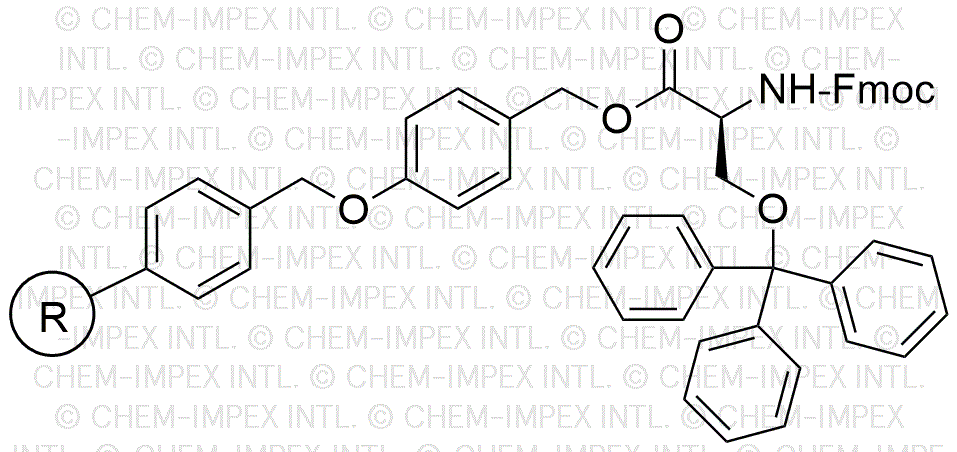Fmoc-Ser(Trt)-Wang Resin is widely utilized in research focused on:
- Peptide Synthesis: This resin is essential for solid-phase peptide synthesis, allowing researchers to efficiently build peptides with high purity and yield.
- Drug Development: It plays a crucial role in the pharmaceutical industry for developing peptide-based drugs, providing a reliable method for creating complex therapeutic compounds.
- Bioconjugation: The resin facilitates the attachment of peptides to other biomolecules, enhancing the development of targeted drug delivery systems and diagnostic tools.
- Protein Engineering: Researchers use this resin to create modified proteins, enabling the study of protein interactions and functions in various biological processes.
- Custom Synthesis: It allows for the customization of peptide sequences, catering to specific research needs in fields like immunology and cancer research.
General Information
Properties
Safety and Regulations
Applications
Fmoc-Ser(Trt)-Wang Resin is widely utilized in research focused on:
- Peptide Synthesis: This resin is essential for solid-phase peptide synthesis, allowing researchers to efficiently build peptides with high purity and yield.
- Drug Development: It plays a crucial role in the pharmaceutical industry for developing peptide-based drugs, providing a reliable method for creating complex therapeutic compounds.
- Bioconjugation: The resin facilitates the attachment of peptides to other biomolecules, enhancing the development of targeted drug delivery systems and diagnostic tools.
- Protein Engineering: Researchers use this resin to create modified proteins, enabling the study of protein interactions and functions in various biological processes.
- Custom Synthesis: It allows for the customization of peptide sequences, catering to specific research needs in fields like immunology and cancer research.
Documents
Safety Data Sheets (SDS)
The SDS provides comprehensive safety information on handling, storage, and disposal of the product.
Product Specification (PS)
The PS provides a comprehensive breakdown of the product’s properties, including chemical composition, physical state, purity, and storage requirements. It also details acceptable quality ranges and the product's intended applications.
Certificates of Analysis (COA)
Search for Certificates of Analysis (COA) by entering the products Lot Number. Lot and Batch Numbers can be found on a product’s label following the words ‘Lot’ or ‘Batch’.
Número de catálogo
Número de lote/lote
Certificates Of Origin (COO)
This COO confirms the country where the product was manufactured, and also details the materials and components used in it and whether it is derived from natural, synthetic, or other specific sources. This certificate may be required for customs, trade, and regulatory compliance.
Número de catálogo
Número de lote/lote
Safety Data Sheets (SDS)
The SDS provides comprehensive safety information on handling, storage, and disposal of the product.
DownloadProduct Specification (PS)
The PS provides a comprehensive breakdown of the product’s properties, including chemical composition, physical state, purity, and storage requirements. It also details acceptable quality ranges and the product's intended applications.
DownloadCertificates of Analysis (COA)
Search for Certificates of Analysis (COA) by entering the products Lot Number. Lot and Batch Numbers can be found on a product’s label following the words ‘Lot’ or ‘Batch’.
Número de catálogo
Número de lote/lote
Certificates Of Origin (COO)
This COO confirms the country where the product was manufactured, and also details the materials and components used in it and whether it is derived from natural, synthetic, or other specific sources. This certificate may be required for customs, trade, and regulatory compliance.


